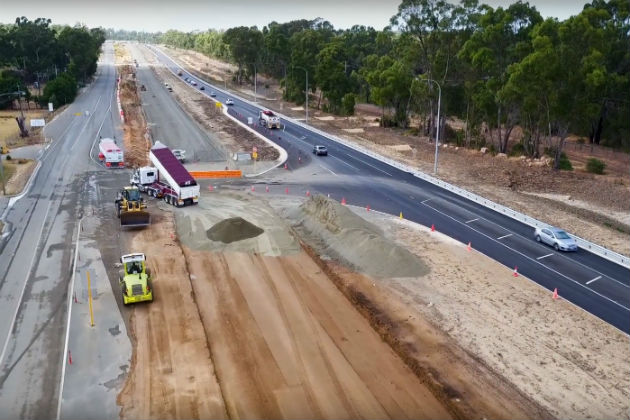24 October, 2017 By: Courtney Pearson
With millions of tonnes of plastic and non-recyclable materials going into landfill every year, using this waste to build our roads could solve many problems.
However Jambulingam Street is special. It's made of polymer glue from shredded waste plastic and was one of India's first plastic roads.
India started using plastic in roads around 15 years ago to combat the growing waste problem - plastic roads don’t crack and they don’t get any potholes, according to India’s Central Pollution Control Board. In the past five years alone more than 1600 tonnes of plastic was used to lay more than 1000km of roads in Tamil Nadu.
Australia has no shortage of waste it can call on. We produce about 50 million tonnes of waste per year, recycling about 58 per cent. The rest goes into landfill - a mix of household rubbish, commercial and industrial waste, plus waste from building and construction sites.
Using that waste in our roads is increasingly becoming a viable option. Right across Australia, waste items are becoming part of the road infrastructure, with construction waste like glass and rubble and even printer toner being used to build our highways.
Researchers from RMIT University in Melbourne are even recommending that non-biodegradable cigarette butts are used to make new roads.
WA rubbish transforming into roads
WA is on board with the recycling roads trend. Our roads are typically made of asphalt with a layer of virgin limestone underneath. Because limestone is a finite resource, WA gets the added benefit of protecting our resources plus reducing landfill through recycled roads.
“Using waste to create roads means we can conserve our current stocks of gravel, limestone and bitumen, which are unrenewable sources of materials,” says Louis Bettini, Main Roads WA Principal Advisor on Sustainability.
Enjoying this article?
Sign up to our monthly enews
"We’ve got a commitment to looking at recycled content. So we're sure to use as much as is technically feasible, and do our bit to help with the challenges of waste, conserving materials and lowering our carbon footprint," says Bettini.
So far, Main Roads has used 1000 tonnes of crushed, crumbed rubber from waste tyres to lay roads in the Goldfields, while parts of the Mitchell Freeway extension near Wanneroo Road included recycled crushed glass.

Other construction and demolition waste like plastic and even reclaimed asphalt can be used – even the famous Taj on Swan site at Peppermint Grove was ground up into road base, with rubble supplied to local governments to create a base for minor roads.
Bettini says different recycled materials offer different benefits.
"We’re always looking at recycled materials that maintain or improve the performance of the road," says Bettini.
"Certain plastic is better suited for when there’s heavy traffic and where vehicles are turning, and there are other plastics better for straight road where there are less vehicles – so it might be better for regional areas.
"We think using crumb rubber can lead to better performance of the road pavement itself. In some instances it’s more durable to our climate conditions which can have greater temperature variability. This attribute will also help adapt our roads to climate change."
While Bettini says we are some way off having 100 per cent recycled roads, she says the benefits mean the practice will only increase.
"There will be a greater level of recycled content in our roads in the future," he says. "There are so many benefits across the WA community that we can drive from using more recycled materials."
Enjoy this story? Get more of the same delivered to your inbox. Sign up to For the Better eNews.
Recycled roads around the world
- The Indian city of Jamshedpur has more than 50km of its roads made from waste plastic, which is shredded to 2mm thick and used to bind the construction mix.
- In Europe, Netherlands company VolkerWessels will unveil its PlasticRoad by KWS concept by the end of this year. The idea is to recycle plastic into weather-resistant lightweight, hollow modules - with space for cables, pipes and water drainage - that slot together like Lego.
- UK start-up MacRebur is pushing local governments to use waste plastic pellets to bind asphalt rather than bitumen. The company has been testing their product through trials by local councils for the past two years.
While this road isn't recycled, it's a fascinating look at how the roads we drive on every day are laid.
